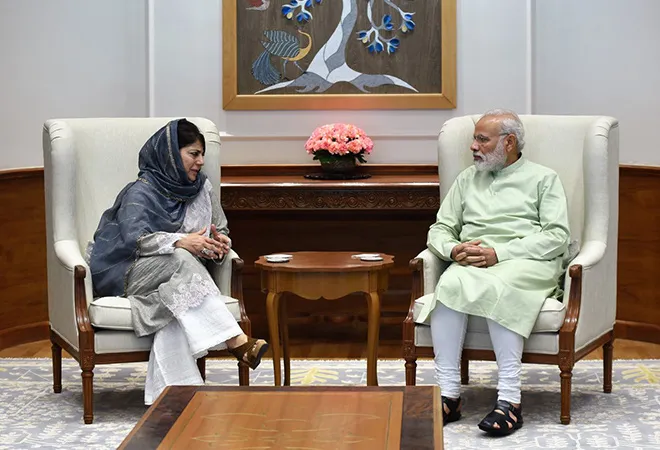Last week, it was video of the army using a local boy as a human shield as they tried to evacuate a group of polling officers under attack by stone pelters. This week, it is the chilling video of gau rakshaks attacking Gujjars, traditional cattle herders, including women and a 9-year-old child taking shelter inside a police post as the violent mob chants "Jai Shri Ram", pushes cops aside and goes about attacking the tin and tarpaulin shelter with lathis and their legs. The physical assault and intimidation is evident, and 11 people have been arrested for it, but the police in Reasi, in the region of Jammu, in a meek attempt to balance narratives, have filed an FIR against the herders for transporting bovines "without permission", even though this particular community does more for the protection and nurturing of cattle, sheep and goats than most others in the country.
This video emerged as Jammu and Kashmir Chief Minister Mehbooba Mufti met with Prime Minister Modi in Delhi while her state spirals south. And even as the opposition calls for her removal and the imposition of President's Rule, both the BJP and the PDP, in some alternate reality, insist their coalition that stunned the Valley when it was announced in early 2015, is working well. Its backers even today claim it's out-of-the-box boldness is the only glue to keep the state together. In reality, however, it was a Faustian deal — struck for the sole purpose of assuming power. And its true colours are revealed, for anyone who's ready to look.
There have been many turning points in the political history of Kashmir. But the coalition of partners so ideologically antithetical to each other was perhaps a curve ball many in the Valley have not been able to recover from. The PDP for years attacked the BJP as a party whose trajectory was based simply on subjugating Muslims. Today, their own words are coming back to haunt politicians who promised self-rule. And from the Valley, Delhi seems even more uncaring, and unconcerned about the mounting civilian casualties. The Prime Minister's appeals ring hollow to a people unable to step out of their homes or go to work and school, unable to live normal lives. Last August, he urged them to carry laptops and books, not stones. Earlier this month, he said Kashmir needs tourism, not terrorism. But both statements reflect a deep disconnect on his, or the Centre's, behalf with the despair on the ground. From last summer's clashes between stone pelters and security forces, to street protests by students, now to this — self-styled Hindu cow vigilantes targeting Muslim cattle herders — the cycle of hate and communalism is spinning out of control, and fast.
In the chaos, those calling for dialogue to stem the flow of blood are being forced to choose a side, even though there are many more than just two.
Beyond issuing the occasional strike calendar, the separatist Hurriyat, many of whose leaders have been under house arrest for extended periods since last July, has been rendered virtually irrelevant, as young boys organise themselves to take on security forces on the streets. Moderate Kashmiri Muslims who align with India have no voice at all. Majoritarian politics on both sides paints them as "traitors".
Last year, as I travelled in the Valley in the wake of Hizb militant Burhan Wani's killing, the battle lines were only just being identified. The Valley's residents (all avid news consumers) were joining dots — the killing of Mohammad Akhlaq in Dadri, the national debate on the beef ban (neither beef nor pork are eaten in the state), violent statements on love jihad, and the creation of sainik colonies in the Valley, to name a few — and creating a larger picture of communal hatred and vigilantism that is targeting Muslims across the country. Since then, the lines have only hardened. Each incident, irrespective of where it takes place, feeds into a growing conviction in the Valley that the BJP-ruled central government is only interested in pushing a communal agenda, and cares only about the land, not the people. That conviction in turn fuels the right-wing narrative that looks at the political dispute over Kashmir purely through a prism of radical Islam and terrorism stoked by Pakistan, nothing more.
As I write this, the Bajrang Dal has demanded the release of the men arrested in Reasi, and the Jammu and Kashmir police have urged Gujjars to travel with their herds in the day- for their own safety. We have come to a pass where even those entrusted with protecting civilians — and Indian citizens, irrespective of religion or political leanings — from crime and assault seem to be hand-wringing before vigilantes who act with impunity. As religious binaries entrench themselves with each such incident, the politics and violence that has governed the Kashmiri landscape has taken on a new dimension, juxtaposed against growing communalism, nationwide.
While Mehbooba Mufti meets her most unsuitable political partner in Delhi, she must know that her timid silence with the Centre will get her discredited government nowhere. If she is to survive politically at all, it is for her to urge PM Modi to open meaningful dialogue himself with the people of the Valley and wrest the narrative back from those who claim to speak and act on his behalf. In the absence of that initiative, the spiral of violence could continue to spin downward.
This commentary originally appeared in NDTV.
The views expressed above belong to the author(s). ORF research and analyses now available on Telegram! Click here to access our curated content — blogs, longforms and interviews.




 PREV
PREV



